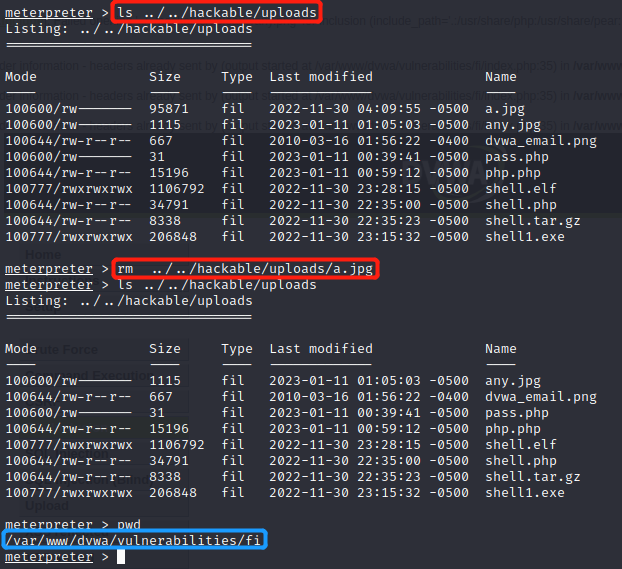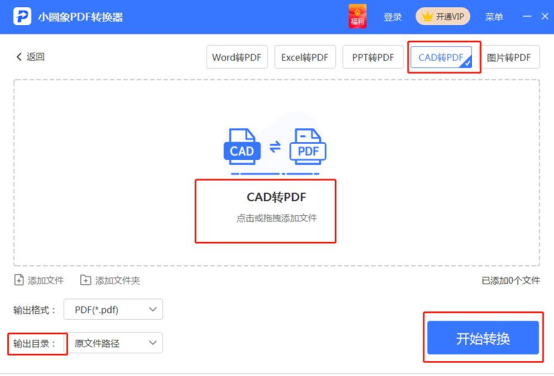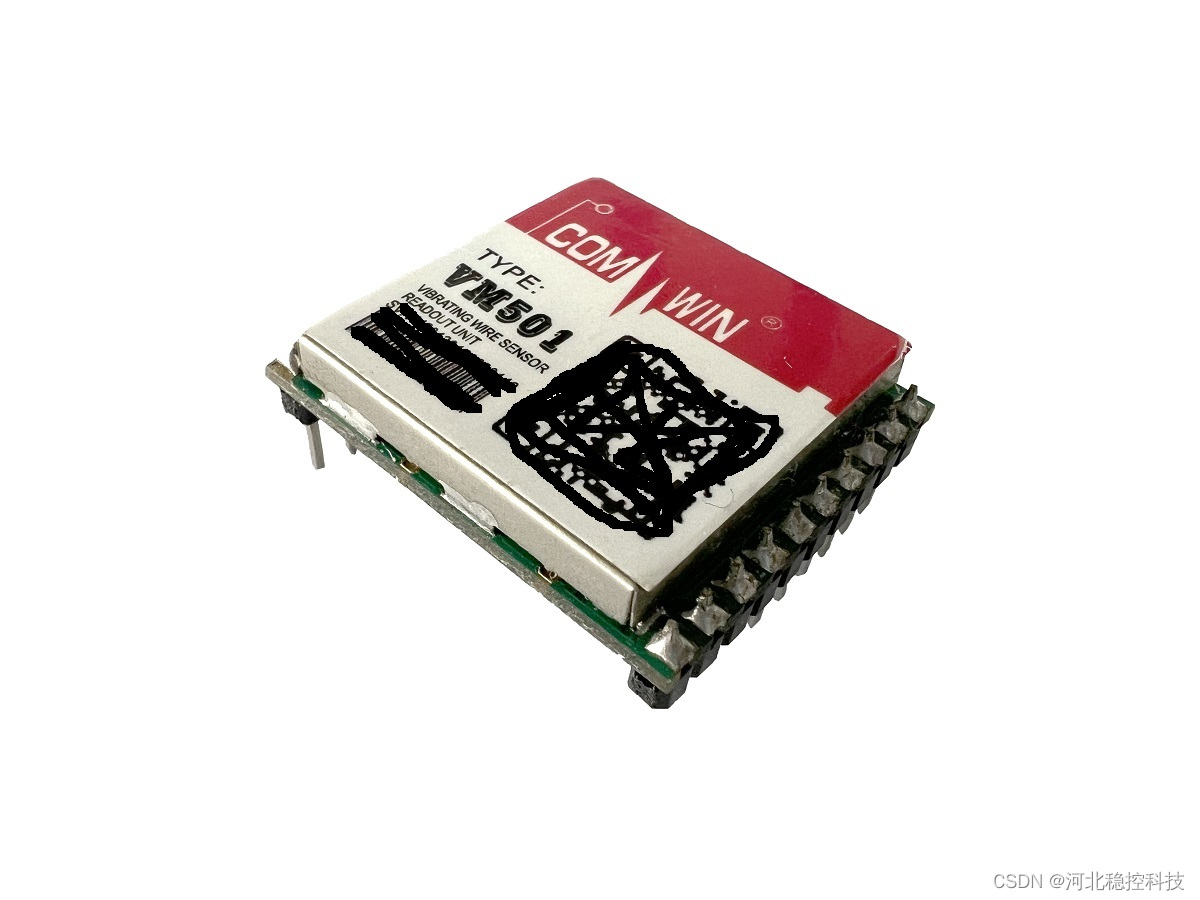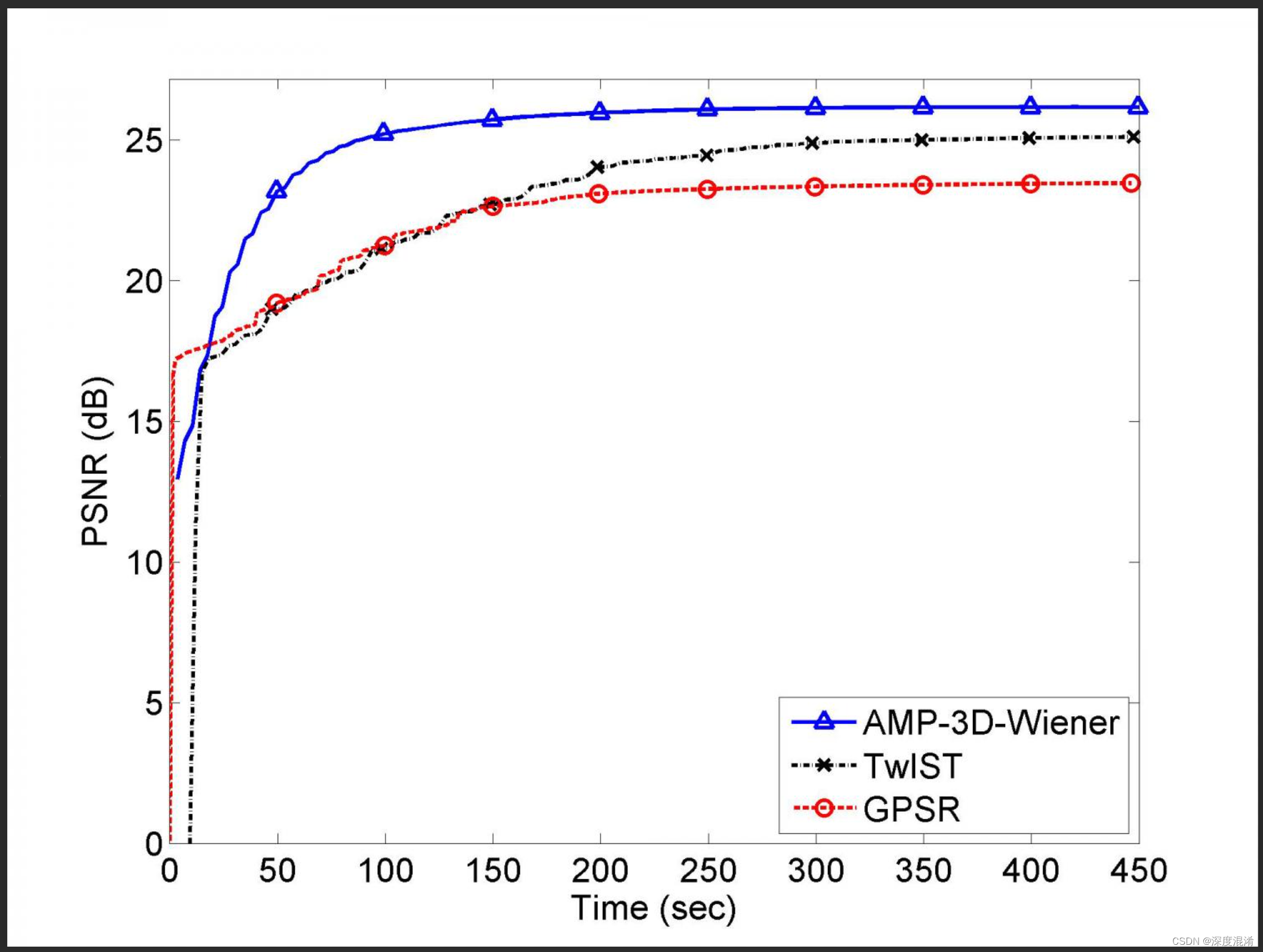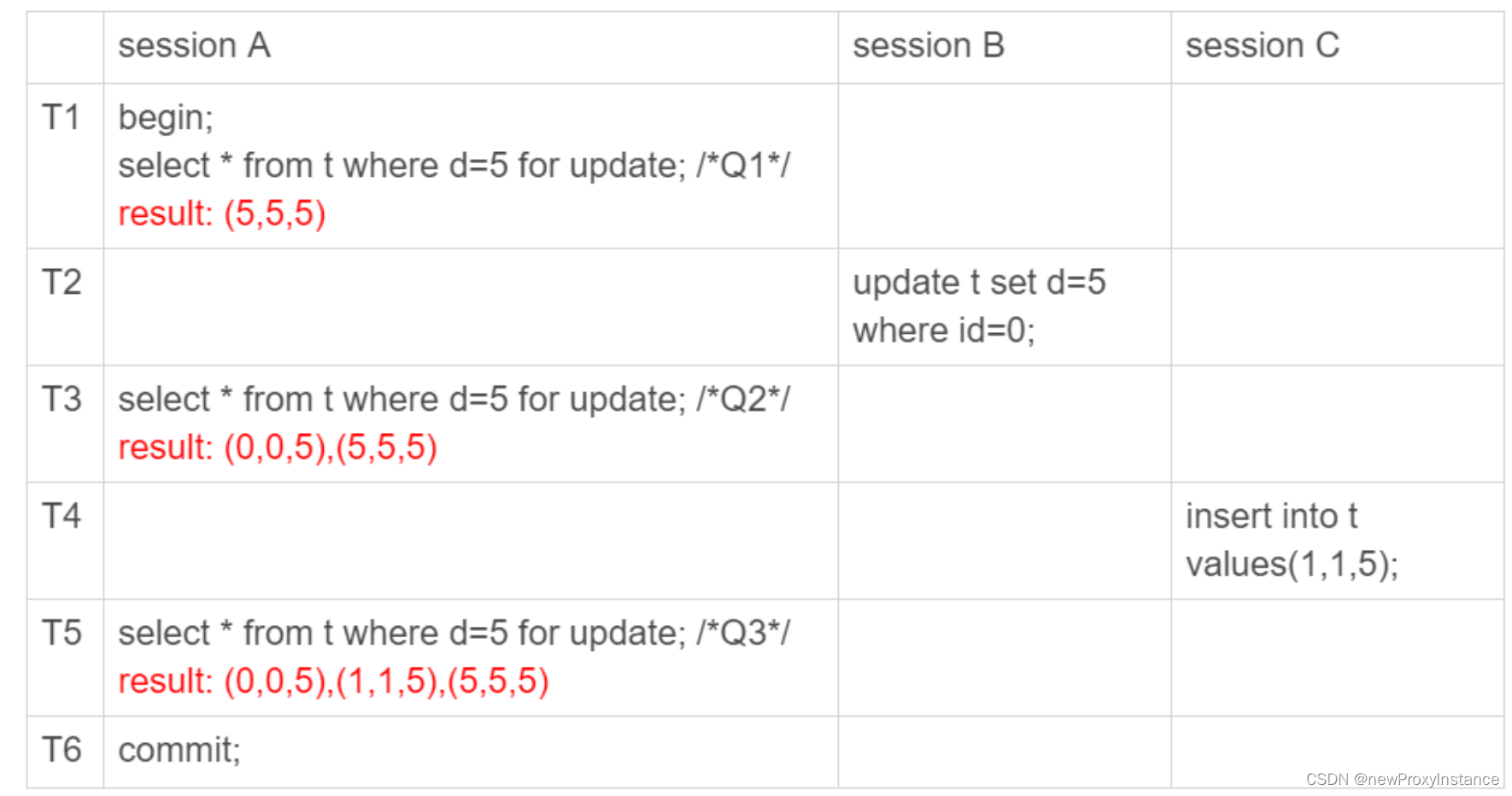一、醉言醉语话夏娃
跟Qt框架打了这么久交道,Qt貌似对我的半斤八两知根知底,我对Qt的认知却还不到半斤八两。o(╥﹏╥)o
或许你知道Qt的meta-object和属性系统,或许你在写代码时无数次显示或者隐示的继承了QObject,不管人家是否乐意的就为她创造了无数个儿子、孙子、曾孙子、曾曾孙子… 但是,你真的了解QObject么?所以,我怀着满心的敬意决定掘无数Qt子类的祖坟,摸摸QObject这美女( 我自视她为Qt世界的夏娃)有个几斤几两~
当然,受限于个人能力水平,xxoo 可能不够深入,有兴趣的朋友可以yy一番,如果类似更深刻的狎妓经验分享一二,吾自当视如珍宝,细细品读,不甚感谢~

二、子子孙孙、无穷无尽(人话:超能干)
奉上一张QObject的族谱,看看他繁衍子孙后代的能力~ 哦,我不干净了!但,我干净过么~
WPS的pdf转图片工具还是个小趴菜,我这才1.6M的pdf居然转失败了,白瞎了我买的vip(吐槽一波)
另外,上次积分兑换的笔记本支架也是一言难尽(发散性吐槽)
只能缩小范围了,以Qt-Core模块为例:
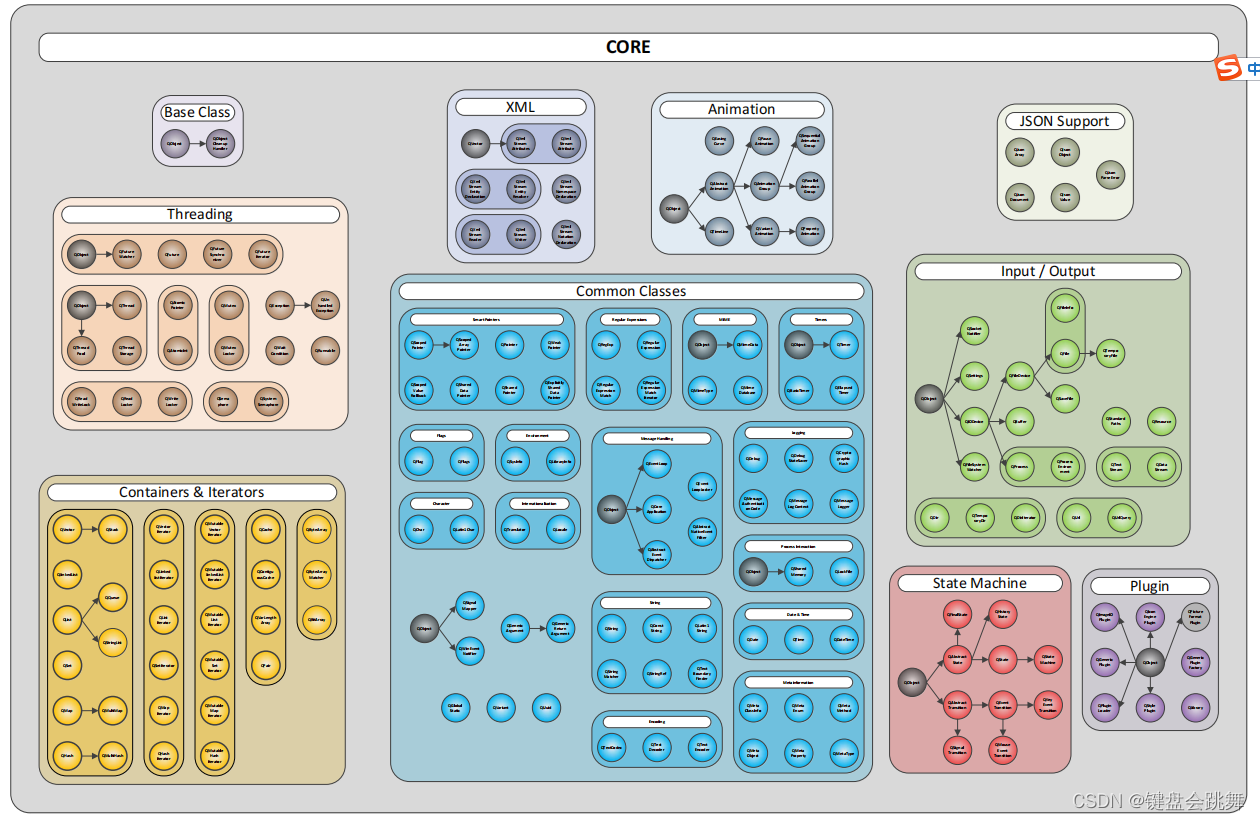
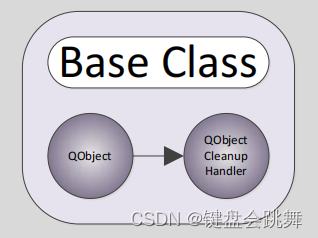
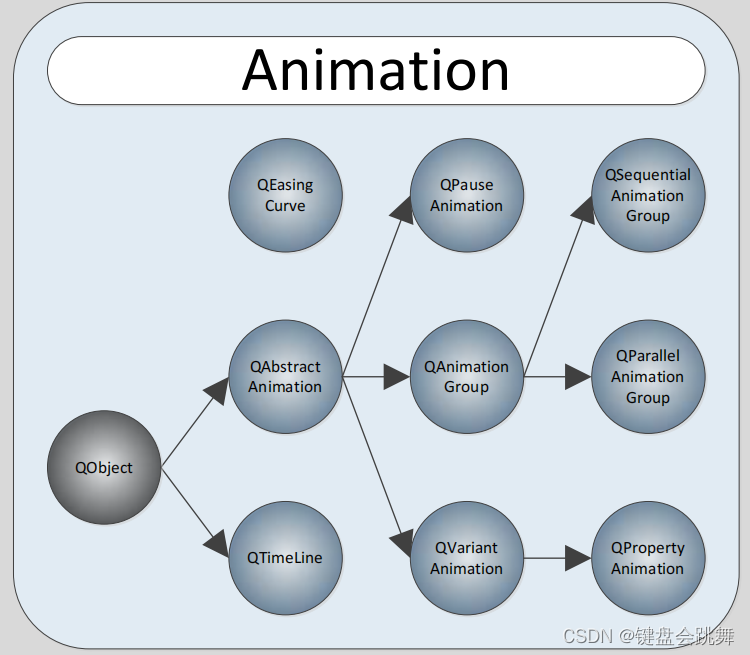
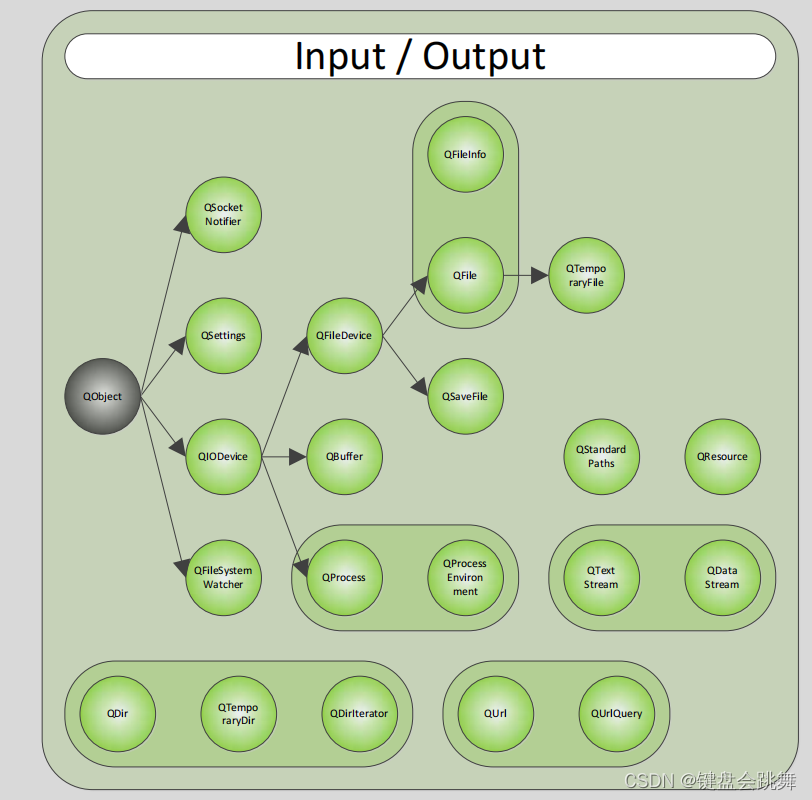

…
太多了不贴不贴了,贴贴也是要跟夏娃贴贴。++(此处念佳佳)
所以用不着我废话说QObject到底有多少子子孙孙,子子孙孙又子子孙孙,反反复复无穷尽矣。
三、贴贴就贴贴
/****************************************************************************
**
** Copyright (C) 2016 The Qt Company Ltd.
** Copyright (C) 2013 Olivier Goffart <ogoffart@woboq.com>
** Contact: https://www.qt.io/licensing/
**
** This file is part of the QtCore module of the Qt Toolkit.
**
** $QT_BEGIN_LICENSE:LGPL$
** Commercial License Usage
** Licensees holding valid commercial Qt licenses may use this file in
** accordance with the commercial license agreement provided with the
** Software or, alternatively, in accordance with the terms contained in
** a written agreement between you and The Qt Company. For licensing terms
** and conditions see https://www.qt.io/terms-conditions. For further
** information use the contact form at https://www.qt.io/contact-us.
**
** GNU Lesser General Public License Usage
** Alternatively, this file may be used under the terms of the GNU Lesser
** General Public License version 3 as published by the Free Software
** Foundation and appearing in the file LICENSE.LGPL3 included in the
** packaging of this file. Please review the following information to
** ensure the GNU Lesser General Public License version 3 requirements
** will be met: https://www.gnu.org/licenses/lgpl-3.0.html.
**
** GNU General Public License Usage
** Alternatively, this file may be used under the terms of the GNU
** General Public License version 2.0 or (at your option) the GNU General
** Public license version 3 or any later version approved by the KDE Free
** Qt Foundation. The licenses are as published by the Free Software
** Foundation and appearing in the file LICENSE.GPL2 and LICENSE.GPL3
** included in the packaging of this file. Please review the following
** information to ensure the GNU General Public License requirements will
** be met: https://www.gnu.org/licenses/gpl-2.0.html and
** https://www.gnu.org/licenses/gpl-3.0.html.
**
** $QT_END_LICENSE$
**
****************************************************************************/
#ifndef QOBJECT_H
#define QOBJECT_H
#ifndef QT_NO_QOBJECT
#include <QtCore/qobjectdefs.h>
#include <QtCore/qstring.h>
#include <QtCore/qbytearray.h>
#include <QtCore/qlist.h>
#ifdef QT_INCLUDE_COMPAT
#include <QtCore/qcoreevent.h>
#endif
#include <QtCore/qscopedpointer.h>
#include <QtCore/qmetatype.h>
#include <QtCore/qobject_impl.h>
#if __has_include(<chrono>)
# include <chrono>
#endif
QT_BEGIN_NAMESPACE
class QEvent;
class QTimerEvent;
class QChildEvent;
struct QMetaObject;
class QVariant;
class QObjectPrivate;
class QObject;
class QThread;
class QWidget;
class QAccessibleWidget;
#ifndef QT_NO_REGEXP
class QRegExp;
#endif
#if QT_CONFIG(regularexpression)
class QRegularExpression;
#endif
#if !QT_DEPRECATED_SINCE(5, 14) || QT_VERSION >= QT_VERSION_CHECK(6, 0, 0)
# define QT_NO_USERDATA
#endif
#ifndef QT_NO_USERDATA
class QObjectUserData;
#endif
struct QDynamicMetaObjectData;
typedef QList<QObject*> QObjectList;
Q_CORE_EXPORT void qt_qFindChildren_helper(const QObject *parent, const QString &name,
const QMetaObject &mo, QList<void *> *list, Qt::FindChildOptions options);
Q_CORE_EXPORT void qt_qFindChildren_helper(const QObject *parent, const QRegExp &re,
const QMetaObject &mo, QList<void *> *list, Qt::FindChildOptions options);
Q_CORE_EXPORT void qt_qFindChildren_helper(const QObject *parent, const QRegularExpression &re,
const QMetaObject &mo, QList<void *> *list, Qt::FindChildOptions options);
Q_CORE_EXPORT QObject *qt_qFindChild_helper(const QObject *parent, const QString &name, const QMetaObject &mo, Qt::FindChildOptions options);
class Q_CORE_EXPORT QObjectData {
Q_DISABLE_COPY(QObjectData)
public:
QObjectData() = default;
virtual ~QObjectData() = 0;
QObject *q_ptr;
QObject *parent;
QObjectList children;
uint isWidget : 1;
uint blockSig : 1;
uint wasDeleted : 1;
uint isDeletingChildren : 1;
uint sendChildEvents : 1;
uint receiveChildEvents : 1;
uint isWindow : 1; //for QWindow
uint deleteLaterCalled : 1;
uint unused : 24;
int postedEvents;
QDynamicMetaObjectData *metaObject;
QMetaObject *dynamicMetaObject() const;
#ifdef QT_DEBUG
enum { CheckForParentChildLoopsWarnDepth = 4096 };
#endif
};
class Q_CORE_EXPORT QObject
{
Q_OBJECT
Q_PROPERTY(QString objectName READ objectName WRITE setObjectName NOTIFY objectNameChanged)
Q_DECLARE_PRIVATE(QObject)
public:
Q_INVOKABLE explicit QObject(QObject *parent=nullptr);
virtual ~QObject();
virtual bool event(QEvent *event);
virtual bool eventFilter(QObject *watched, QEvent *event);
#if defined(QT_NO_TRANSLATION) || defined(Q_CLANG_QDOC)
static QString tr(const char *sourceText, const char * = nullptr, int = -1)
{ return QString::fromUtf8(sourceText); }
#if QT_DEPRECATED_SINCE(5, 0)
QT_DEPRECATED static QString trUtf8(const char *sourceText, const char * = nullptr, int = -1)
{ return QString::fromUtf8(sourceText); }
#endif
#endif //QT_NO_TRANSLATION
QString objectName() const;
void setObjectName(const QString &name);
inline bool isWidgetType() const { return d_ptr->isWidget; }
inline bool isWindowType() const { return d_ptr->isWindow; }
inline bool signalsBlocked() const noexcept { return d_ptr->blockSig; }
bool blockSignals(bool b) noexcept;
QThread *thread() const;
void moveToThread(QThread *thread);
int startTimer(int interval, Qt::TimerType timerType = Qt::CoarseTimer);
#if __has_include(<chrono>)
Q_ALWAYS_INLINE
int startTimer(std::chrono::milliseconds time, Qt::TimerType timerType = Qt::CoarseTimer)
{
return startTimer(int(time.count()), timerType);
}
#endif
void killTimer(int id);
template<typename T>
inline T findChild(const QString &aName = QString(), Qt::FindChildOptions options = Qt::FindChildrenRecursively) const
{
typedef typename std::remove_cv<typename std::remove_pointer<T>::type>::type ObjType;
return static_cast<T>(qt_qFindChild_helper(this, aName, ObjType::staticMetaObject, options));
}
template<typename T>
inline QList<T> findChildren(const QString &aName = QString(), Qt::FindChildOptions options = Qt::FindChildrenRecursively) const
{
typedef typename std::remove_cv<typename std::remove_pointer<T>::type>::type ObjType;
QList<T> list;
qt_qFindChildren_helper(this, aName, ObjType::staticMetaObject,
reinterpret_cast<QList<void *> *>(&list), options);
return list;
}
#ifndef QT_NO_REGEXP
#if QT_DEPRECATED_SINCE(5, 13)
template<typename T>
QT_DEPRECATED_X("Use findChildren(const QRegularExpression &, ...) instead.")
inline QList<T> findChildren(const QRegExp &re, Qt::FindChildOptions options = Qt::FindChildrenRecursively) const
{
typedef typename std::remove_cv<typename std::remove_pointer<T>::type>::type ObjType;
QList<T> list;
qt_qFindChildren_helper(this, re, ObjType::staticMetaObject,
reinterpret_cast<QList<void *> *>(&list), options);
return list;
}
#endif
#endif
#if QT_CONFIG(regularexpression)
template<typename T>
inline QList<T> findChildren(const QRegularExpression &re, Qt::FindChildOptions options = Qt::FindChildrenRecursively) const
{
typedef typename std::remove_cv<typename std::remove_pointer<T>::type>::type ObjType;
QList<T> list;
qt_qFindChildren_helper(this, re, ObjType::staticMetaObject,
reinterpret_cast<QList<void *> *>(&list), options);
return list;
}
#endif // QT_CONFIG(regularexpression)
inline const QObjectList &children() const { return d_ptr->children; }
void setParent(QObject *parent);
void installEventFilter(QObject *filterObj);
void removeEventFilter(QObject *obj);
static QMetaObject::Connection connect(const QObject *sender, const char *signal,
const QObject *receiver, const char *member, Qt::ConnectionType = Qt::AutoConnection);
static QMetaObject::Connection connect(const QObject *sender, const QMetaMethod &signal,
const QObject *receiver, const QMetaMethod &method,
Qt::ConnectionType type = Qt::AutoConnection);
inline QMetaObject::Connection connect(const QObject *sender, const char *signal,
const char *member, Qt::ConnectionType type = Qt::AutoConnection) const;
#ifdef Q_CLANG_QDOC
template<typename PointerToMemberFunction>
static QMetaObject::Connection connect(const QObject *sender, PointerToMemberFunction signal, const QObject *receiver, PointerToMemberFunction method, Qt::ConnectionType type = Qt::AutoConnection);
template<typename PointerToMemberFunction, typename Functor>
static QMetaObject::Connection connect(const QObject *sender, PointerToMemberFunction signal, Functor functor);
template<typename PointerToMemberFunction, typename Functor>
static QMetaObject::Connection connect(const QObject *sender, PointerToMemberFunction signal, const QObject *context, Functor functor, Qt::ConnectionType type = Qt::AutoConnection);
#else
//Connect a signal to a pointer to qobject member function
template <typename Func1, typename Func2>
static inline QMetaObject::Connection connect(const typename QtPrivate::FunctionPointer<Func1>::Object *sender, Func1 signal,
const typename QtPrivate::FunctionPointer<Func2>::Object *receiver, Func2 slot,
Qt::ConnectionType type = Qt::AutoConnection)
{
typedef QtPrivate::FunctionPointer<Func1> SignalType;
typedef QtPrivate::FunctionPointer<Func2> SlotType;
Q_STATIC_ASSERT_X(QtPrivate::HasQ_OBJECT_Macro<typename SignalType::Object>::Value,
"No Q_OBJECT in the class with the signal");
//compilation error if the arguments does not match.
Q_STATIC_ASSERT_X(int(SignalType::ArgumentCount) >= int(SlotType::ArgumentCount),
"The slot requires more arguments than the signal provides.");
Q_STATIC_ASSERT_X((QtPrivate::CheckCompatibleArguments<typename SignalType::Arguments, typename SlotType::Arguments>::value),
"Signal and slot arguments are not compatible.");
Q_STATIC_ASSERT_X((QtPrivate::AreArgumentsCompatible<typename SlotType::ReturnType, typename SignalType::ReturnType>::value),
"Return type of the slot is not compatible with the return type of the signal.");
const int *types = nullptr;
if (type == Qt::QueuedConnection || type == Qt::BlockingQueuedConnection)
types = QtPrivate::ConnectionTypes<typename SignalType::Arguments>::types();
return connectImpl(sender, reinterpret_cast<void **>(&signal),
receiver, reinterpret_cast<void **>(&slot),
new QtPrivate::QSlotObject<Func2, typename QtPrivate::List_Left<typename SignalType::Arguments, SlotType::ArgumentCount>::Value,
typename SignalType::ReturnType>(slot),
type, types, &SignalType::Object::staticMetaObject);
}
//connect to a function pointer (not a member)
template <typename Func1, typename Func2>
static inline typename std::enable_if<int(QtPrivate::FunctionPointer<Func2>::ArgumentCount) >= 0, QMetaObject::Connection>::type
connect(const typename QtPrivate::FunctionPointer<Func1>::Object *sender, Func1 signal, Func2 slot)
{
return connect(sender, signal, sender, slot, Qt::DirectConnection);
}
//connect to a function pointer (not a member)
template <typename Func1, typename Func2>
static inline typename std::enable_if<int(QtPrivate::FunctionPointer<Func2>::ArgumentCount) >= 0 &&
!QtPrivate::FunctionPointer<Func2>::IsPointerToMemberFunction, QMetaObject::Connection>::type
connect(const typename QtPrivate::FunctionPointer<Func1>::Object *sender, Func1 signal, const QObject *context, Func2 slot,
Qt::ConnectionType type = Qt::AutoConnection)
{
typedef QtPrivate::FunctionPointer<Func1> SignalType;
typedef QtPrivate::FunctionPointer<Func2> SlotType;
Q_STATIC_ASSERT_X(QtPrivate::HasQ_OBJECT_Macro<typename SignalType::Object>::Value,
"No Q_OBJECT in the class with the signal");
//compilation error if the arguments does not match.
Q_STATIC_ASSERT_X(int(SignalType::ArgumentCount) >= int(SlotType::ArgumentCount),
"The slot requires more arguments than the signal provides.");
Q_STATIC_ASSERT_X((QtPrivate::CheckCompatibleArguments<typename SignalType::Arguments, typename SlotType::Arguments>::value),
"Signal and slot arguments are not compatible.");
Q_STATIC_ASSERT_X((QtPrivate::AreArgumentsCompatible<typename SlotType::ReturnType, typename SignalType::ReturnType>::value),
"Return type of the slot is not compatible with the return type of the signal.");
const int *types = nullptr;
if (type == Qt::QueuedConnection || type == Qt::BlockingQueuedConnection)
types = QtPrivate::ConnectionTypes<typename SignalType::Arguments>::types();
return connectImpl(sender, reinterpret_cast<void **>(&signal), context, nullptr,
new QtPrivate::QStaticSlotObject<Func2,
typename QtPrivate::List_Left<typename SignalType::Arguments, SlotType::ArgumentCount>::Value,
typename SignalType::ReturnType>(slot),
type, types, &SignalType::Object::staticMetaObject);
}
//connect to a functor
template <typename Func1, typename Func2>
static inline typename std::enable_if<QtPrivate::FunctionPointer<Func2>::ArgumentCount == -1, QMetaObject::Connection>::type
connect(const typename QtPrivate::FunctionPointer<Func1>::Object *sender, Func1 signal, Func2 slot)
{
return connect(sender, signal, sender, std::move(slot), Qt::DirectConnection);
}
//connect to a functor, with a "context" object defining in which event loop is going to be executed
template <typename Func1, typename Func2>
static inline typename std::enable_if<QtPrivate::FunctionPointer<Func2>::ArgumentCount == -1, QMetaObject::Connection>::type
connect(const typename QtPrivate::FunctionPointer<Func1>::Object *sender, Func1 signal, const QObject *context, Func2 slot,
Qt::ConnectionType type = Qt::AutoConnection)
{
typedef QtPrivate::FunctionPointer<Func1> SignalType;
const int FunctorArgumentCount = QtPrivate::ComputeFunctorArgumentCount<Func2 , typename SignalType::Arguments>::Value;
Q_STATIC_ASSERT_X((FunctorArgumentCount >= 0),
"Signal and slot arguments are not compatible.");
const int SlotArgumentCount = (FunctorArgumentCount >= 0) ? FunctorArgumentCount : 0;
typedef typename QtPrivate::FunctorReturnType<Func2, typename QtPrivate::List_Left<typename SignalType::Arguments, SlotArgumentCount>::Value>::Value SlotReturnType;
Q_STATIC_ASSERT_X((QtPrivate::AreArgumentsCompatible<SlotReturnType, typename SignalType::ReturnType>::value),
"Return type of the slot is not compatible with the return type of the signal.");
Q_STATIC_ASSERT_X(QtPrivate::HasQ_OBJECT_Macro<typename SignalType::Object>::Value,
"No Q_OBJECT in the class with the signal");
const int *types = nullptr;
if (type == Qt::QueuedConnection || type == Qt::BlockingQueuedConnection)
types = QtPrivate::ConnectionTypes<typename SignalType::Arguments>::types();
return connectImpl(sender, reinterpret_cast<void **>(&signal), context, nullptr,
new QtPrivate::QFunctorSlotObject<Func2, SlotArgumentCount,
typename QtPrivate::List_Left<typename SignalType::Arguments, SlotArgumentCount>::Value,
typename SignalType::ReturnType>(std::move(slot)),
type, types, &SignalType::Object::staticMetaObject);
}
#endif //Q_CLANG_QDOC
static bool disconnect(const QObject *sender, const char *signal,
const QObject *receiver, const char *member);
static bool disconnect(const QObject *sender, const QMetaMethod &signal,
const QObject *receiver, const QMetaMethod &member);
inline bool disconnect(const char *signal = nullptr,
const QObject *receiver = nullptr, const char *member = nullptr) const
{ return disconnect(this, signal, receiver, member); }
inline bool disconnect(const QObject *receiver, const char *member = nullptr) const
{ return disconnect(this, nullptr, receiver, member); }
static bool disconnect(const QMetaObject::Connection &);
#ifdef Q_CLANG_QDOC
template<typename PointerToMemberFunction>
static bool disconnect(const QObject *sender, PointerToMemberFunction signal, const QObject *receiver, PointerToMemberFunction method);
#else
template <typename Func1, typename Func2>
static inline bool disconnect(const typename QtPrivate::FunctionPointer<Func1>::Object *sender, Func1 signal,
const typename QtPrivate::FunctionPointer<Func2>::Object *receiver, Func2 slot)
{
typedef QtPrivate::FunctionPointer<Func1> SignalType;
typedef QtPrivate::FunctionPointer<Func2> SlotType;
Q_STATIC_ASSERT_X(QtPrivate::HasQ_OBJECT_Macro<typename SignalType::Object>::Value,
"No Q_OBJECT in the class with the signal");
//compilation error if the arguments does not match.
Q_STATIC_ASSERT_X((QtPrivate::CheckCompatibleArguments<typename SignalType::Arguments, typename SlotType::Arguments>::value),
"Signal and slot arguments are not compatible.");
return disconnectImpl(sender, reinterpret_cast<void **>(&signal), receiver, reinterpret_cast<void **>(&slot),
&SignalType::Object::staticMetaObject);
}
template <typename Func1>
static inline bool disconnect(const typename QtPrivate::FunctionPointer<Func1>::Object *sender, Func1 signal,
const QObject *receiver, void **zero)
{
// This is the overload for when one wish to disconnect a signal from any slot. (slot=nullptr)
// Since the function template parameter cannot be deduced from '0', we use a
// dummy void ** parameter that must be equal to 0
Q_ASSERT(!zero);
typedef QtPrivate::FunctionPointer<Func1> SignalType;
return disconnectImpl(sender, reinterpret_cast<void **>(&signal), receiver, zero,
&SignalType::Object::staticMetaObject);
}
#endif //Q_CLANG_QDOC
#if QT_VERSION < QT_VERSION_CHECK(6, 0, 0)
void dumpObjectTree(); // ### Qt 6: remove
void dumpObjectInfo(); // ### Qt 6: remove
#endif
void dumpObjectTree() const;
void dumpObjectInfo() const;
#ifndef QT_NO_PROPERTIES
bool setProperty(const char *name, const QVariant &value);
QVariant property(const char *name) const;
QList<QByteArray> dynamicPropertyNames() const;
#endif // QT_NO_PROPERTIES
#ifndef QT_NO_USERDATA
QT_DEPRECATED_VERSION_5_14
static uint registerUserData();
QT_DEPRECATED_VERSION_X_5_14("Use setProperty()")
void setUserData(uint id, QObjectUserData* data);
QT_DEPRECATED_VERSION_X_5_14("Use property()")
QObjectUserData* userData(uint id) const;
#endif // QT_NO_USERDATA
Q_SIGNALS:
void destroyed(QObject * = nullptr);
void objectNameChanged(const QString &objectName, QPrivateSignal);
public:
inline QObject *parent() const { return d_ptr->parent; }
inline bool inherits(const char *classname) const
{ return const_cast<QObject *>(this)->qt_metacast(classname) != nullptr; }
public Q_SLOTS:
void deleteLater();
protected:
QObject *sender() const;
int senderSignalIndex() const;
int receivers(const char* signal) const;
bool isSignalConnected(const QMetaMethod &signal) const;
virtual void timerEvent(QTimerEvent *event);
virtual void childEvent(QChildEvent *event);
virtual void customEvent(QEvent *event);
virtual void connectNotify(const QMetaMethod &signal);
virtual void disconnectNotify(const QMetaMethod &signal);
protected:
QObject(QObjectPrivate &dd, QObject *parent = nullptr);
protected:
QScopedPointer<QObjectData> d_ptr;
static const QMetaObject staticQtMetaObject;
friend inline const QMetaObject *qt_getQtMetaObject() noexcept;
friend struct QMetaObject;
friend struct QMetaObjectPrivate;
friend class QMetaCallEvent;
friend class QApplication;
friend class QApplicationPrivate;
friend class QCoreApplication;
friend class QCoreApplicationPrivate;
friend class QWidget;
friend class QAccessibleWidget;
friend class QThreadData;
private:
Q_DISABLE_COPY(QObject)
Q_PRIVATE_SLOT(d_func(), void _q_reregisterTimers(void *))
private:
static QMetaObject::Connection connectImpl(const QObject *sender, void **signal,
const QObject *receiver, void **slotPtr,
QtPrivate::QSlotObjectBase *slot, Qt::ConnectionType type,
const int *types, const QMetaObject *senderMetaObject);
static bool disconnectImpl(const QObject *sender, void **signal, const QObject *receiver, void **slot,
const QMetaObject *senderMetaObject);
};
inline QMetaObject::Connection QObject::connect(const QObject *asender, const char *asignal,
const char *amember, Qt::ConnectionType atype) const
{ return connect(asender, asignal, this, amember, atype); }
inline const QMetaObject *qt_getQtMetaObject() noexcept
{ return &QObject::staticQtMetaObject; }
#ifndef QT_NO_USERDATA
class Q_CORE_EXPORT QObjectUserData {
Q_DISABLE_COPY(QObjectUserData)
public:
QObjectUserData() = default;
virtual ~QObjectUserData();
};
#endif
#if QT_DEPRECATED_SINCE(5, 0)
template<typename T>
inline QT_DEPRECATED T qFindChild(const QObject *o, const QString &name = QString())
{ return o->findChild<T>(name); }
template<typename T>
inline QT_DEPRECATED QList<T> qFindChildren(const QObject *o, const QString &name = QString())
{
return o->findChildren<T>(name);
}
#if !defined(QT_NO_REGEXP) || defined(Q_CLANG_QDOC)
template<typename T>
inline QT_DEPRECATED QList<T> qFindChildren(const QObject *o, const QRegExp &re)
{
return o->findChildren<T>(re);
}
#endif
#endif //QT_DEPRECATED
template <class T>
inline T qobject_cast(QObject *object)
{
typedef typename std::remove_cv<typename std::remove_pointer<T>::type>::type ObjType;
Q_STATIC_ASSERT_X(QtPrivate::HasQ_OBJECT_Macro<ObjType>::Value,
"qobject_cast requires the type to have a Q_OBJECT macro");
return static_cast<T>(ObjType::staticMetaObject.cast(object));
}
template <class T>
inline T qobject_cast(const QObject *object)
{
typedef typename std::remove_cv<typename std::remove_pointer<T>::type>::type ObjType;
Q_STATIC_ASSERT_X(QtPrivate::HasQ_OBJECT_Macro<ObjType>::Value,
"qobject_cast requires the type to have a Q_OBJECT macro");
return static_cast<T>(ObjType::staticMetaObject.cast(object));
}
template <class T> inline const char * qobject_interface_iid()
{ return nullptr; }
#if defined(Q_CLANG_QDOC)
# define Q_DECLARE_INTERFACE(IFace, IId)
#elif !defined(Q_MOC_RUN)
# define Q_DECLARE_INTERFACE(IFace, IId) \
template <> inline const char *qobject_interface_iid<IFace *>() \
{ return IId; } \
template <> inline IFace *qobject_cast<IFace *>(QObject *object) \
{ return reinterpret_cast<IFace *>((object ? object->qt_metacast(IId) : nullptr)); } \
template <> inline IFace *qobject_cast<IFace *>(const QObject *object) \
{ return reinterpret_cast<IFace *>((object ? const_cast<QObject *>(object)->qt_metacast(IId) : nullptr)); }
#endif // Q_MOC_RUN
#ifndef QT_NO_DEBUG_STREAM
Q_CORE_EXPORT QDebug operator<<(QDebug, const QObject *);
#endif
class QSignalBlocker
{
public:
inline explicit QSignalBlocker(QObject *o) noexcept;
inline explicit QSignalBlocker(QObject &o) noexcept;
inline ~QSignalBlocker();
inline QSignalBlocker(QSignalBlocker &&other) noexcept;
inline QSignalBlocker &operator=(QSignalBlocker &&other) noexcept;
inline void reblock() noexcept;
inline void unblock() noexcept;
private:
Q_DISABLE_COPY(QSignalBlocker)
QObject * m_o;
bool m_blocked;
bool m_inhibited;
};
QSignalBlocker::QSignalBlocker(QObject *o) noexcept
: m_o(o),
m_blocked(o && o->blockSignals(true)),
m_inhibited(false)
{}
QSignalBlocker::QSignalBlocker(QObject &o) noexcept
: m_o(&o),
m_blocked(o.blockSignals(true)),
m_inhibited(false)
{}
QSignalBlocker::QSignalBlocker(QSignalBlocker &&other) noexcept
: m_o(other.m_o),
m_blocked(other.m_blocked),
m_inhibited(other.m_inhibited)
{
other.m_o = nullptr;
}
QSignalBlocker &QSignalBlocker::operator=(QSignalBlocker &&other) noexcept
{
if (this != &other) {
// if both *this and other block the same object's signals:
// unblock *this iff our dtor would unblock, but other's wouldn't
if (m_o != other.m_o || (!m_inhibited && other.m_inhibited))
unblock();
m_o = other.m_o;
m_blocked = other.m_blocked;
m_inhibited = other.m_inhibited;
// disable other:
other.m_o = nullptr;
}
return *this;
}
QSignalBlocker::~QSignalBlocker()
{
if (m_o && !m_inhibited)
m_o->blockSignals(m_blocked);
}
void QSignalBlocker::reblock() noexcept
{
if (m_o) m_o->blockSignals(true);
m_inhibited = false;
}
void QSignalBlocker::unblock() noexcept
{
if (m_o) m_o->blockSignals(m_blocked);
m_inhibited = true;
}
namespace QtPrivate {
inline QObject & deref_for_methodcall(QObject &o) { return o; }
inline QObject & deref_for_methodcall(QObject *o) { return *o; }
}
#define Q_SET_OBJECT_NAME(obj) QT_PREPEND_NAMESPACE(QtPrivate)::deref_for_methodcall(obj).setObjectName(QLatin1String(#obj))
QT_END_NAMESPACE
#endif
#endif // QOBJECT_H
洋洋洒洒,包括注释才600余行代码,当然他还包含一些头文件,具体的那些我会在 温酒读Qt:QObject 中篇 一一同大家一起品品,反复抽插。这里面会包含大量的泛型和模板相关的姿势,期待后续吧。
此篇就这样,该搂着温香软玉午休小憩一番了~ 那巫山云雨呵。


